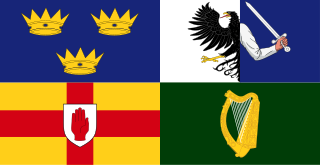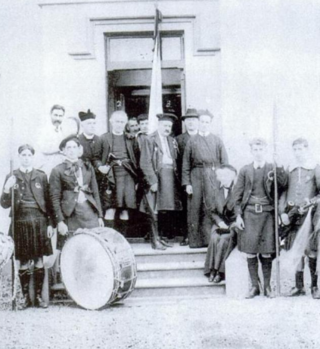
Irish folklore refers to the folktales,balladry,music,dance and mythology of Ireland. It is the study and appreciation of how people lived.
Collective memory refers to the shared pool of memories,knowledge and information of a social group that is significantly associated with the group's identity. The English phrase "collective memory" and the equivalent French phrase "la mémoire collective" appeared in the second half of the nineteenth century. The philosopher and sociologist Maurice Halbwachs analyzed and advanced the concept of the collective memory in the book Les cadres sociaux de la mémoire (1925).
Roddy McCorley was an Irish nationalist from the civil parish of Duneane,County Antrim,Ireland. Following the publication of the Ethna Carbery poem bearing his name in 1902,where he is associated with events around the Battle of Antrim,he is alleged to have been a member of the United Irishmen and claimed as a participant in their rebellion of 1798.

Anita Shapira is an Israeli historian. She is the founder of the Yitzhak Rabin Center,professor emerita of Jewish history at Tel Aviv University,and former head of the Weizmann Institute for the Study of Zionism at Tel Aviv University. She received the Israel Prize in 2008.
Ethnohistory is the study of cultures and indigenous peoples customs by examining historical records as well as other sources of information on their lives and history. It is also the study of the history of various ethnic groups that may or may not still exist. The term is most commonly used in writing about the history of the Americas.
Cultural memory is a form of collective memory shared by a group of people who share a culture. The theory posits that memory is not just an individual,private experience but also part of the collective domain,which both shapes the future and our understanding of the past. It has become a topic in both historiography,which emphasizes the process of forming cultural memory,and cultural studies,which emphasizes the implications and objects of cultural memory.
The Folklore Society (FLS) is a registered charity under English law based in London,England for the study of folklore. Its office is at 50 Fitzroy Street,London home of the Royal Anthropological Institute of Great Britain and Ireland.
Hanna Yablonka is an Israeli historian and scholar. Born in Tel Aviv,she is a Professor of Holocaust Studies at Ben-Gurion University of the Negev and staff historian for the Ghetto Fighters' House.

Richard Robert Madden was an Irish doctor,writer,abolitionist and historian of the United Irishmen. Madden took an active role in trying to impose anti-slavery rules in Jamaica on behalf of the British government.

Tuvia Friling is an Emeritus professor at Ben-Gurion University of the Negev,Israel. Previously he served as a senior researcher at the Ben-Gurion Research Institute for the Study of Israel and Zionism and a lecturer at the Israel Studies Program both at Ben-Gurion University of the Negev.
Social amnesia is a collective forgetting by a group of people. The concept is often cited in relation to Russell Jacoby's scholarship from the 1970s. Social amnesia can be a result of "forcible repression" of memories,ignorance,changing circumstances,or the forgetting that comes from changing interests. Protest,folklore,"local memory",and collective nostalgia are counter forces that combat social amnesia.
Memorialization generally refers to the process of preserving memories of people or events. It can be a form of address or petition,or a ceremony of remembrance or commemoration.

Marianne Hirsch is the William Peterfield Trent Professor of English and Comparative Literature at Columbia University and Professor in the Institute for Research on Women,Gender,and Sexuality.
A lieu de mémoire is a physical place or object which acts as container of memory. They are thus a form of memorialisation related to collective memory,stating that certain places,objects or events can have special significance related to group's remembrance. It is a term used in heritage and collective memory studies popularised by the French historian Pierre Nora in his three-volume collection Les Lieux de Mémoire. Nora describes them as “complex things. At once natural and artificial,simple and ambiguous,concrete and abstract,they are lieux—places,sites,causes—in three senses—material,symbolic and functional”.
The George L. Mosse Prize is a history book prize awarded annually by the American Historical Association for "an outstanding major work of extraordinary scholarly distinction,creativity,and originality in the intellectual and cultural history of Europe since 1500".

The Croppies' Acre,officially the Croppies Acre Memorial Park,is a public park in Dublin,Ireland. It contains a memorial to the dead of the 1798 Rebellion.

Francis Joseph Bigger was an Irish antiquarian,revivalist,solicitor,architect,author,editor,Member of the Royal Irish Academy,and Fellow of the Royal Society of Antiquaries of Ireland. His collected library,now distributed across several public institutions,comprised more than 18,000 books,journals,letters,photographs,sketches,maps,and other materials. His house in Belfast was a gathering place for Irish nationalist politicians,artists,scholars,and others. He was a prolific sponsor and promoter of Gaelic culture,authored many works of his own,founded several institutions,and revived and edited the Ulster Journal of Archaeology.
The Irish Historical Research Prize is a history book prize awarded biannually since 1922 by the National University of Ireland (NUI) to a senior historian for the best new work of research on any period in the history of Ireland. It is considered the most prestigious prize in the study of Irish history.
The Wayland D. Hand Prize is an award given by the History and Folklore section of the American Folklore Society (AFS) for the best book combining historical and folkloristic methods and materials. The biennial prize honors the eminent folklorist Wayland D. Hand (1907-1986),a former president of the American Folklore Society (1955-1967) who in his teaching and scholarship encouraged historical methodology in folklore research.

De-commemoration is a social phenomenon that regards the destruction or profound modification of material representations of the past in public space,representing the opposite or undoing of memorialization. The precise term was coined by Israeli historian Guy Beiner in 2018.








